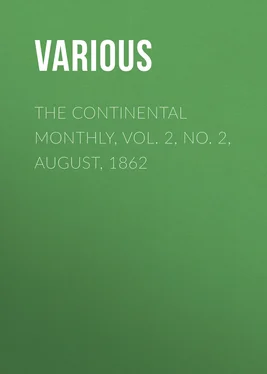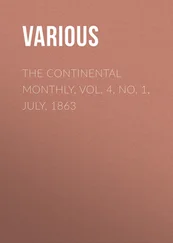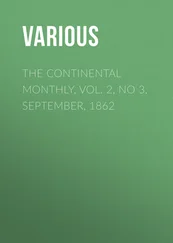Various - The Continental Monthly, Vol. 2, No. 2, August, 1862
Здесь есть возможность читать онлайн «Various - The Continental Monthly, Vol. 2, No. 2, August, 1862» — ознакомительный отрывок электронной книги совершенно бесплатно, а после прочтения отрывка купить полную версию. В некоторых случаях можно слушать аудио, скачать через торрент в формате fb2 и присутствует краткое содержание. Жанр: foreign_antique, periodic, Языкознание, Политика, foreign_edu, на английском языке. Описание произведения, (предисловие) а так же отзывы посетителей доступны на портале библиотеки ЛибКат.
- Название:The Continental Monthly, Vol. 2, No. 2, August, 1862
- Автор:
- Жанр:
- Год:неизвестен
- ISBN:нет данных
- Рейтинг книги:4 / 5. Голосов: 1
-
Избранное:Добавить в избранное
- Отзывы:
-
Ваша оценка:
- 80
- 1
- 2
- 3
- 4
- 5
The Continental Monthly, Vol. 2, No. 2, August, 1862: краткое содержание, описание и аннотация
Предлагаем к чтению аннотацию, описание, краткое содержание или предисловие (зависит от того, что написал сам автор книги «The Continental Monthly, Vol. 2, No. 2, August, 1862»). Если вы не нашли необходимую информацию о книге — напишите в комментариях, мы постараемся отыскать её.
The Continental Monthly, Vol. 2, No. 2, August, 1862 — читать онлайн ознакомительный отрывок
Ниже представлен текст книги, разбитый по страницам. Система сохранения места последней прочитанной страницы, позволяет с удобством читать онлайн бесплатно книгу «The Continental Monthly, Vol. 2, No. 2, August, 1862», без необходимости каждый раз заново искать на чём Вы остановились. Поставьте закладку, и сможете в любой момент перейти на страницу, на которой закончили чтение.
Интервал:
Закладка:
Rocjean, one afternoon, after a walk on the Pincio, was returning to his studio, when, as he descended to the Via Babuino, he met a Roman artist named Attonito, who cultivated the English.
'Ow arr you toe-day, my dear?' he asked Rocjean.
'Quite well, except a slight attack of bad English, from which I hope to recover in a few minutes.'
'Pray tell unto me th-hat weech is bad Englis.'
'Haven't you been on the Pincio?'
'Yas, I tak' consteetutionails up there avery afternoons; it is a costume Englis' th-hat I vary moche cotton to.'…
'W-hat! Cotton to? Why, that is a clear Americanism; where did you pick it up?'
'Meester Caper of Noo-York, he told unto me it am more elegant as to say, I love, or I affection. Bote, 'ave you saw that bu-tee-fool creechure with 'air of flags?'…
'What!'
''Air of flags; 'ow you name eet? Capellatura di lino? '
'Oh! you mean tow-head?'
'Toe! no, no! I mean lino .'
'Ah! yes, flaxen hair.'
' Benissimo! Vary well, flagson 'air and blue eyze. Shhe was in carri-adge with Lady Blumpudy. I go avery afternoons to inspect her as she takes the airs on the Pincio, Eet would gife me great pleasures to ally myself to her in marriage compact, bote I do not know eef she has a fortune. Do you know any theengs?'
'Yes, a great many; one of which is that it is my dinner-time, and as I turn down the Condotti—good afternoon.'
'Goo-ood by, my dear,' answered Attonito, as he slowly wandered up the Piazza di Spagna.
Another example of the beneficial effects of the Pincio on the bourgeoise , thought Rocjean. When will the alarm-bell in the clock of Roman time ring out its awaking peal?
ROME BY NIGHT
If one would realize the romantic side of Rome in all its stately grandeur, and receive a solemn and ineffaceable impression of its beauty, by all means let him, like Quevedo's hero, sleep 'a-daytime' and do his sight-seeing by moonlight or star-light; for, save in some few favored quarters, its inspection by gaslight would be difficult. Remember, too, that all that is grandly beautiful of Rome, the traveler has seen before he reaches the Imperial City—with the eyes of understanding, with the eyes of others—in books.
Nothing but a heap of old stones, bricks, and mortar is there here for the illiterate tourist—he can have six times as jolly a time in Paris for half the money that he pays 'in that old hole where a fellow named Culius Jæsar used to live.'
As if the night were not sufficiently dark in this city, there are always those who stand ready with the paint-brush of fancy to make it even of a darker hue; whisperings among the travelers in hotels of certain Jim Joneses or Bill Smiths who have been robbed. Yes, sir, early in the evening, right there in the Corso: grabbed his watch and chain, struck him on the head. You know he was a powerfully built man; but they came behind him, and if he hadn't have done so and so, the rascally Italians would have killed him, and so forth.
'Re-al-ly; well, you won't catch me out at nights!'
There rises up, as I write, the figure of a slim young man, of the day-time negro-minstrel style of beauty, who once dwelt three weeks in Rome. I know that he was profound in knowledge of trick and vice, and that he had an impediment in his speech—he could never speak the truth. He told a fearful tale of a midnight robbery in the Piazza di Spagna—himself the victim. It was well told, and I ought to know, for I read it years before in a romance, only the scene was, in type, laid in Venice. According to this negro-minstrel style of youth, he had been seized from behind, held, robbed of watch and elegant gold chain, red coral shirt-studs, onyx sleeve-buttons, and a porte-monnaie containing fifty scudi, etc., etc. He was the theatrical hero of the hotel for two days, and the recipient of many drinks. Time, the cater of things, never digested this falsehood, and months after the youth had left, I learned that he had lost all his jewelry and money at—twenty-deck poker.
A few nights after Caper was domiciled in the Via Babuino, Rocjean called on him, and as he entered his room, carefully extinguished a taper, and was putting it in his pocket, when Caper asked him what that was for?
'That! it's a cerina . Have you been two weeks in Rome, and not found out that? Why, how did you get up-stairs at night?'
'There was a lamp in the entry.'
'None there to-night, so I had to light this. It's only a long piece of wick, dipped in wax; you see you can roll it up in a ball, and carry it in your pocket, so! Without this and a box of matches, you can never hope to be a good Roman. You must have seen that where the houses have any front-doors, three quarters of them are open all night long; for, as on every floor of a house, there live different families, they find it saves trouble—trouble is money in Rome—to leave the door unclosed. These dark entries, for they are seldom lighted, offer a grand chance for intrigues, and when you have lived here as long as I have, you will find out that they—improve the chances. A cerina , in addition to keeping you from breaking your neck, by tumbling down stone stairs, gives light to avoid the stray dogs that sleep around loose, and to see if there is any enemy around who wants to give you a few inches of cold steel. You may laugh at robbers here; but you may cry for mercy in vain to a Roman who seeks vendetta —revenge, you know. Bad way to use foreign words; but we all do it here. Speak an Italianized English after a time, the effect of had examples. But come, if you want to see Rome by moonlight, it's time we were off.'
As they reached the street, Caper asked Rocjean where he could buy the cerina .
'At any dragheria ' said the latter.
'Good, there is a druggist's store up the street—Borioni's.'
'A dragheria means a grocery-store in Rome. If you want molasses, however, you must go to the farmacia for it, [that is the Roman for druggist's shop,] and you will buy it by the ounce.'
'Live and learn,' said Caper, as they entered the grocery and bought the cerina -price, one baioccho a yard.
'And now let us walk out to Saint Peter's, and see the church by moonlight.'
'The want of sidewalks in this city,' remarked Rocjean, 'compelling the Romans to walk over cobble-stones, undoubtedly is the cause of the large feet of the women, added to their dislike of being in pain from tight shoes or boots. For genuine martyrdom from tight shoes, French, Spanish, and Americans—but chiefly Cubans—next to Chinese women, are ahead of the world.'
'But apart from the fact that they do walk on the narrow sidewalks in the Corso, I have noticed that in the side-streets, even where there is a foot-walk, nobody takes advantage of it at night.'
'For a good reason, as we shall probably see,' said Rocjean,' before we reach the bridge of San Angelo. But keep close to me in the middle of the street.'
The moonlight shone brightly down the narrow street they were then walking through, which, but for this, the occasional dim light of an oil-lamp hung in front of a shrine, the light from a wine or grocery shop, and the ruddy blaze of a charcoal-fire, where chestnuts were roasting for sale, would have been dark indeed. The ground-floor of very few Roman houses is ever occupied as a dwelling-place; it is given up to shops, stables, etc., the families residing, according to their wealth, on the lowest up to the highest stories; the light purses going up and the heavy ones sinking. They had walked nearly to the end of this street, when, happening to look up at the fourth story of a house, he saw something white being reversed in the moonlight, and the next instant a long stream of water, reminding him of the horse-tail fall in Switzerland, came splashing down where a sidewalk should have been.
Читать дальшеИнтервал:
Закладка:
Похожие книги на «The Continental Monthly, Vol. 2, No. 2, August, 1862»
Представляем Вашему вниманию похожие книги на «The Continental Monthly, Vol. 2, No. 2, August, 1862» списком для выбора. Мы отобрали схожую по названию и смыслу литературу в надежде предоставить читателям больше вариантов отыскать новые, интересные, ещё непрочитанные произведения.
Обсуждение, отзывы о книге «The Continental Monthly, Vol. 2, No. 2, August, 1862» и просто собственные мнения читателей. Оставьте ваши комментарии, напишите, что Вы думаете о произведении, его смысле или главных героях. Укажите что конкретно понравилось, а что нет, и почему Вы так считаете.












